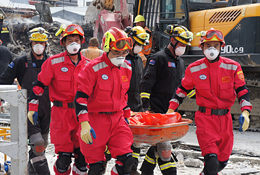|
 |
 |
|
ROAD OF FRIENDSHIP: Residents in a small village in south Lebanon wave goodbye on November 27, 2011, to Chinese peacekeepers, who completed a road for the village that day (ZHAN HUIQIANG) |
INTERNATIONAL RESCUE: Members of a Chinese rescue team carry a body from an earthquake-hit building in Christchurch, New Zealand, on February 26, 2011 (WANG MANDA) |
The concept also reminds Chinese foreign policy makers that China shouldn't follow Western powers' hegemony model of forcing other nations to accept solutions with an iron fist. Instead, China should use cautious, creative and constructive mediation when dealing with international issues. By sticking to and promoting our ideas such as new concepts on development and security and the vision of a harmonious world, which are based on Oriental civilization and Chinese wisdom of moderation and tolerance, China can properly deal with its relations with other nations, improve its image as a responsible power and have a greater say in international affairs.
"Creative involvement" is a concept that focuses on diplomatic, commercial and military fields and stresses improving flexibility and skills of foreign affairs-related departments. It can be considered as a new direction for China's diplomacy. It will be a new option for China's diplomacy based on its new position and strength as well as its culture and traditions. It will bring a Chinese style to the world stage during the process of the peaceful development of the country.
Although advocating active participation in international affairs, "creative involvement" has essential differences from interventionism. It calls for active contact and involvement instead of intervention by force. It definitely is not an opposition to our traditional diplomatic principles, but an enrichment of these principles.
First, "creative involvement" should be conducted on the basis of international legitimacy. When implementing this strategy, China must follow three principles: obeying the UN Charter, being invited or accepted by local people or a majority of political parties in the state concerned, and conforming to the wishes of most of its neighboring countries.
Second, the strategy must be carried out according to China's capability after cautious deliberation. China must classify its core interests, important interests, general interests and secondary interests. "Creative involvement" should be a selective move that China makes when dealing with affairs concerning its vital interests.
Third, "creative involvement" stresses diplomatic mediation and economic assistance instead of a military-first approach or armed suppression. It encourages the active exploration of all possible diplomatic options. Military force at most serves as a method of deterrence.
China now is at an important stage of economic transformation, during which economic reforms must be carried out. China's diplomacy also needs reform and transformation. "Creative involvement" is not only a craft, a skill, and an adjustment of attitude, but also a new diplomatic method that is in accordance with the current domestic and international situations. It emphasizes the originality and constructive function of China's diplomacy.
The Chinese Government should establish incentive mechanisms to encourage the diplomatic transition. It should encourage diplomats and diplomacy-related departments to conduct proactive, original and unconventional moves when dealing with foreign affairs. People from other professions are also expected to show a greater interest in international affairs and get involved.
China's economic strength is growing very fast. Unfortunately, we have to say that we have yet to pay equal attention to our cultural influence. To some foreigners, China is still a lame giant, due to the insufficient global public goods that China has provided. China should increase the quality and quantity of its foreign assistance and shoulder greater international responsibilities in keeping with its growing economic strength. It should also send more young volunteers, medical workers, peacekeeping troops, anti-poverty teams and NGOs abroad to assist countries in need.
| 